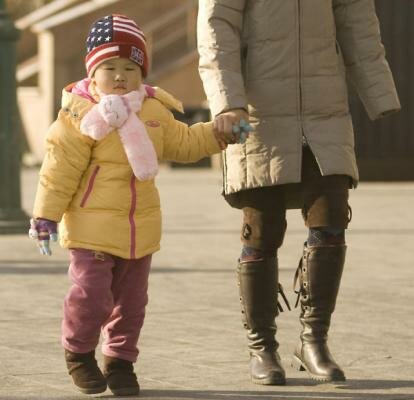How to Have an American Child
Some wealthy Chinese are choosing to give birth in the U.S., so that their babies are born American.

The 14th Amendment legally makes any baby born in the United States an American citizen. This was originally legislated to make children of African-American slaves legitimate in the United States. Since then, the law has been exploited by foreign nationals to gain foot-hold into the country. Illegal immigrants come to the U.S. for birthing and in turn use the babies’ status to gain legal residence.
Apparently, there is a rising wave of Chinese nationals exploiting the 14th Amendment too. The New York Times recently reported, “Arriving as Pregnant Tourists, Leaving With American Babies” where a San Gabriel, California residence was illegally converted for use as a nursery for such purposes. The following passage basically summarised the issue:
Much of the debate has focused on immigrants entering illegally from poor countries in Latin America. But in this case the women were not only relatively wealthy, but also here legally on tourist visas. Most of them, officials say, have already returned to China with their American babies. The article also cited the Center for Health Care Statistics that the most recent data (from 2008) showed 7,462 babies born from non-resident foreign nationals. Unfortunately, the article didn’t say anything about the Pew Hispanic Center’s statistics for illegal immigrant babies: 2.7 million in 2003 and 4.0 million in 2008, a 50% rise in five years!
The controversy across America is really driven by illegal immigrant births. While this “China” phenomenon is not yet rampant, I can see too that in the coming years, more wealthy Chinese nationals taking advantage of this birthright loop-hole. I suppose “China” the bogeyman can always be pulled out the closet, and I cringe at the thought.
Personally, I think this 14th Amendment loop-hole ought to be closed. For most countries, permanent resident’s and citizen’s children inherit citizenship automatically. I don’t think it is heavy-handed to make the same in the U.S. The amendment is a by-product of history, and there is really nothing so sacred about the Constitution forbidding this law from being altered.
Not everything is rosy. This China Daily article reported a baby center in Flushing, New York, misleading their clients about insurance:
The center helps clients to procure a $1,500-worth insurance policy issued by the US government for pregnant women to cover the costs of medical checkups and the delivery.
“You can’t get this yourself. We have our way,” said Gao, whose partner Sandy Zheng is a doctor with the Flushing Hospital Medical Center. “In order to get the insurance, you need documents from a licensed doctor here.”
Tang (an immigrant lawyer) said he doesn’t believe this insurance policy exists.
As the passage suggests, in case of emergency, expenses may very well escalate. Invariably, the client will have to pay.
The NYT article portrayed a “shoddy” living accommodation at the San Gabriel home. But that is probably more of an exception rather than the norm. As the China Daily article illustrated with the Flushing example, I think such places are generally well provided for. At least by wealthy Chinese living standards, they are fine. Remember, these Chinese are well educated and are cosmopolitan. They know a thing or two about safety and what to expect.
If there had been any mishap, bet on the U.S. media jumping all over it. To date, we have not heard of one. The China Daily article also reported a four-month stay ranges from US$21,660 to US$27,800, and that should provide a decent amount of care in the U.S.
On the supply side, such services are well packaged. You don’t need to understand Chinese to get a feel for what this 香水湾 maternity center is offering. Bear in mind, they are not violating any U.S. laws. The 14th Amendment makes their business legitimate, since the mothers are legally entering the U.S. through tourist visas.
Below are listing of eight benefits by 香水湾 (in Chinese with my rough translation):
孩子美国出生,立刻拥有美国身份, 享有公民权利
American-born children automatically have citizenship rights.
American-born children automatically have citizenship rights.
享有就读美国公立小学至高中,完全免学费
Entitled to attend U.S. public elementary through high school free.
读公立大学、研究所学费只要外国学生的10%,容易进入知名大学
Cost of public university tuition will be only 10% that of foreign students. Easy access to well-known universities.
可申请美国公民才能享有的奖学金,1%低利率助学贷款
Apply for scholarships only U.S. citizens are entitled to. 1% low interest rate subsidized student loans.
无条件留在高收入的美国工作,可以优先担任美国政府,公家单位及大型企业重要领导岗位
Can legally remain in high-paying jobs in the U.S., apply for government jobs, and qualify for higher positions.
180多个邦交国入境免签证,最优惠出入境便利
180 some visa-free countries to travel to, facilitate favorable travels.
享有美国各种社会福利措施及医疗设备
Entitled to U.S. social welfare and medical benefits.
美国公民身份可享有美国政府保护撤离
U.S. citizens are eligible for U.S. government protection abroad.
If you put some thought into it, these benefits are not necessarily that “great”. Honestly, I would discourage potential clients from this “maternity tourism”.
From a practical standpoint, without a legal guardian residing in the U.S. it is virtually impossible to enjoy any U.S. benefits. What parents would not want to raise their own child? And, indeed, babies born under such circumstances are brought back. Then, why subject a few-weeks-old infant to such a strenuous journey?
Attending well-known U.S. universities is not by any means “easy”. Assuming their children grow up in China, they will still need to apply just like any other U.S. citizen. They are likely at a disadvantage because they lack the English-language skills as well as the cultural immersion necessary to have a complete and strong application.
Certainly, they will be able to bypass having to compete with other nationals for student visas. The real advantage really comes down to a much easier entry into less known universities in the U.S. Government-subsidised loans are in limited quantity, so there is no guarantee on how much can be borrowed. In few decades, who knows?

















